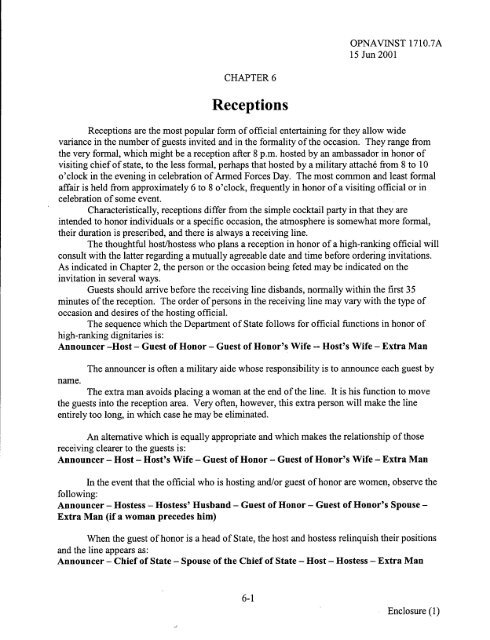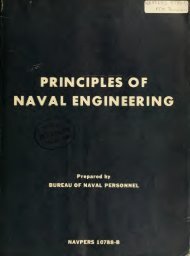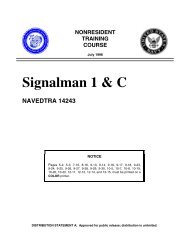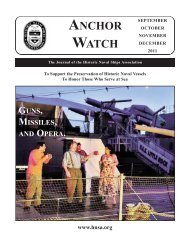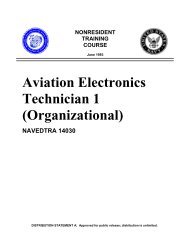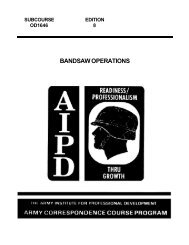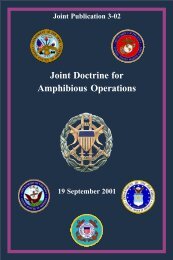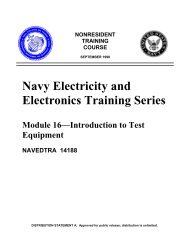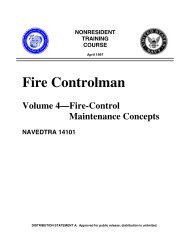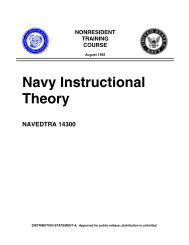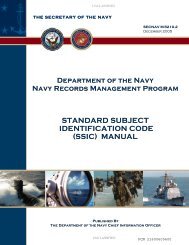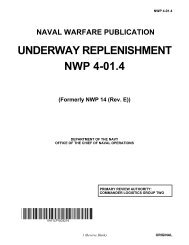OPNAVINST 1710.7A - Historic Naval Ships Association
OPNAVINST 1710.7A - Historic Naval Ships Association
OPNAVINST 1710.7A - Historic Naval Ships Association
You also want an ePaper? Increase the reach of your titles
YUMPU automatically turns print PDFs into web optimized ePapers that Google loves.
<strong>OPNAVINST</strong><br />
15 Jun 2001<br />
171O.7A<br />
CHAPTER 6<br />
Receptions<br />
Receptions are the most popular form of official entertaining for they allow wide<br />
variance in the number of guests invited and in the formality of the occasion. They range from<br />
the very formal, which might be a reception after 8 p.m. hoisted by an ambassador in honor of<br />
visiting chief of state, to the less formal, perhaps that hosted by a military attach6 from 8 to 10<br />
o’clock in the evening in celebration of Armed Forces Day. The most common and least formal<br />
affair is held from approximately 6 to 8 o’clock, frequently in honor of a visiting official or in<br />
celebration of some event.<br />
Characteristically, receptions differ from the simple cocktail party in that they are<br />
intended to honor individuals or a specific occasion, the atmosphere is somewhat more formal,<br />
their duration is prescribed, and there is always a receiving line.<br />
The thoughtful hostlhostess who plans a reception in honor of a high-ranking official will<br />
consult with the latter regarding a mutually agreeable date and time before ordering invitations.<br />
As indicated in Chapter 2, the person or the occasion being feted maybe indicated on the<br />
invitation in several ways.<br />
Guests should arrive before the receiving line disbands, normally within the first 35<br />
minutes of the reception. The order of persons in the receiving line may vary with the type of<br />
occasion and desires of the hosting official.<br />
The sequence which the Department of State follows for official functions in honor of<br />
high-ranking dignitaries is:<br />
Announcer –Host – Guest of Honor – Guest of Honor’s Wife -- Host’s Wife – Extra Man<br />
The announcer is often a military aide whose responsibility is to announce each guest by<br />
name.<br />
The extra man avoids placing a woman at the end of the line. It is his function to move<br />
the guests into the reception area. Very often, however, this extra person will make the line<br />
entirely too long, in which case he maybe eliminated.<br />
An alternative which is equally appropriate and which makes the relationship of those<br />
receiving clearer to the guests is:<br />
Announcer – Host – Host’s Wife – Guest of Honor – Guest of Honor’s Wife – Extra Man<br />
In the event that the official who is hosting and/or guest of honor are women, observe the<br />
following:<br />
Announcer – Hostess – Hostess’ Husband – Guest of Honor – Guest of Honor’s Spouse –<br />
Extra Man (if a woman precedes him)<br />
When the guest of honor is a head of State, the host and hostess relinquish their positions<br />
and the line appears as:<br />
Announcer – Chief of State – Spouse of the Chief of State – Host – Hostess – Extra Man<br />
./<br />
6-1<br />
Enclosure (1)


